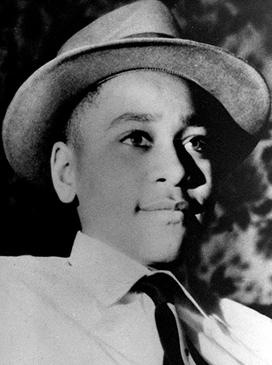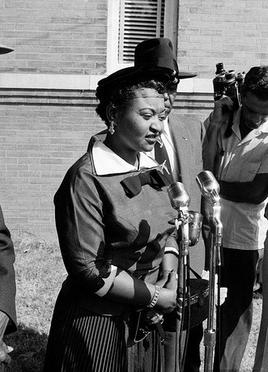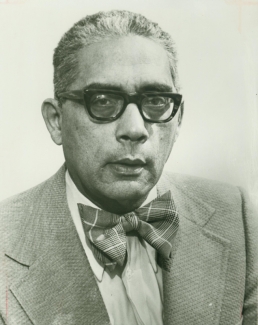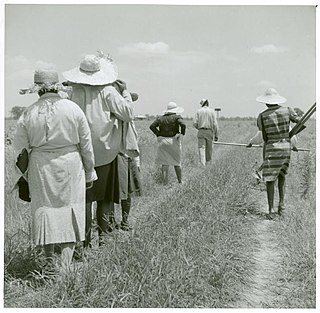
Sumner is a town in Tallahatchie County, Mississippi. The population was 407 at the 2000 census. Sumner is one of the two county seats of Tallahatchie County. It is located on the west side of the county and the Tallahatchie River, which runs through the county north–south. The other county seat is Charleston, located east of the river. Charleston was the first county seat, as settlement came from the east, and it is the larger of the two towns.

Emmett Louis Till was an African American boy who was abducted, tortured, and lynched in Mississippi in 1955 at the age of 14, after being accused of offending a white woman, Carolyn Bryant, in her family's grocery store. The brutality of his murder and the acquittal of his killers drew attention to the long history of violent persecution of African Americans in the United States. Till posthumously became an icon of the civil rights movement.
William Bradford Huie was an American writer, investigative reporter, editor, national lecturer, and television host. His credits include 21 books that sold over 30 million copies worldwide. In addition to writing 14 bestsellers, he wrote hundreds of articles that appeared in all of the major magazines and newspapers of the day.

Money is an unincorporated community near Greenwood in Leflore County, Mississippi, United States, in the Mississippi Delta. It has fewer than 100 residents, down from 400 in the early 1950s when a cotton mill operated there. Money is located on a railroad line along the Tallahatchie River, a tributary of the Yazoo River in the eastern part of the Mississippi Delta. The community has ZIP code 38945 in the Greenwood, Mississippi micropolitan area.

Charles Coles Diggs Jr. was an American politician from the U.S. state of Michigan who served in the state senate and U.S. House of Representatives. He was the first African American elected to Congress from Michigan.

Louis Till was an African American GI during World War II. After enlisting in the United States Army following trial for domestic violence against his estranged wife Mamie Till, and having chosen military service over jail time, Till was court-martialed on two counts of rape and one count of murder during the Italian Campaign. He was found guilty and was executed by hanging at Aversa. Till was the estranged father of Emmett Till, whose murder in August 1955 at the age of 14 galvanized the civil rights movement. The circumstances of Till's death remained largely unknown until they were revealed after the highly controversial acquittal of his son's murderers ten years later.

Mamie Elizabeth Till-Mobley was an American educator and activist. She was the mother of Emmett Till, the 14-year-old teenager murdered in Mississippi on August 28, 1955, after accusations that he had whistled at a Caucasian grocery store cashier named Carolyn Bryant. For Emmett's funeral in Chicago, Mamie Till insisted that the casket containing his body be left open, because, in her words, "I wanted the world to see what they did to my baby."

Simeon Saunders Booker Jr. was an African-American journalist whose work appeared in leading news publications for more than 50 years. He was known for his journalistic works during the civil rights movement and for his coverage of the 1955 murder of 14-year-old Emmett Till. He worked for The Washington Post, Jet, and Ebony.
Christopher Everett Crowe is an American professor of English and English education at Brigham Young University (BYU) specializing in young adult literature. In addition to his academic work, Crowe also writes books for the young-adult market, including Mississippi Trial, 1955.
Gerald Weissinger Chatham was an American lawyer, best known for acting as lead prosecutor in the Emmett Till case in 1955.
The Murder of Emmett Till is a 2003 documentary film produced by Firelight Media that aired on the PBS program American Experience. The film chronicles the story of Emmett Till, a 14-year-old black boy from Chicago visiting relatives in Mississippi in 1955. He was brutally murdered by two white men after a white woman falsely claimed that he had whistled at and groped her.
Hiram is a biblical given name referring to Phoenician kings.
Willie Louis was a witness to the murder of 14-year-old Emmett Till. Till was an African-American child from Chicago who was murdered in 1955 after he had reportedly whistled at a white woman in a Money, Mississippi, grocery store. Till's murder was a watershed moment in the Civil Rights Movement. Louis testified in court about what he had seen, but an all-white jury found the men not guilty. Fearing for his life, Louis moved to Chicago after the trial and changed his name from Willie Reed to Willie Louis. He was interviewed in 2003 for the PBS documentary The Murder of Emmett Till and was interviewed the next year on the CBS News television program 60 Minutes.

African Americans in Mississippi or Black Mississippians are residents of the state of Mississippi who are of African American ancestry. As of the 2019 U.S. Census estimates, African Americans were 37.8% of the state's population which is the highest in the nation.
The history of the 1954 to 1968 American civil rights movement has been depicted and documented in film, song, theater, television, and the visual arts. These presentations add to and maintain cultural awareness and understanding of the goals, tactics, and accomplishments of the people who organized and participated in this nonviolent movement.
James L. Hicks was a member of the black press from 1935 to 1977. He wrote a column for the Baltimore Afro-American advocating opportunities in the U.S. Army. Hicks covered school integration in Little Rock, Arkansas and Oxford, Mississippi, and his coverage of the Emmett Till murder trial in Sumner, Mississippi.

Andrea Nicole Livingstone, known as Nic Stone, is an American author of young adult fiction and middle grade fiction, best known for her debut novel Dear Martin and her middle grade debut, Clean Getaway. Her novels have been translated into six languages.

Getting Away with Murder: The True Story of the Emmett Till Case is a 2003 young adult non-fiction book by American author Chris Crowe. The book details the history of Emmett Till, a teenaged African-American boy, who was abducted and murdered after offending a white woman at a grocery store. The book was positively received and won an American Library Association award for Best Book for Young Adults in 2004 and the Jane Addams Peace Association Honor Book Award for Older Children.
"Mississippi–1955" or "Mississippi" is a poem written by Langston Hughes in response to the 1955 murder of Emmett Till. Hughes was the first major African American writer to pen a response to the killing, and his poem was widely republished in the weeks that followed. It was initially dedicated to Emmett Till, but did not mention him specifically. Hughes republished the poem in 1965 and 1967, revising it in a way that decreased its specific applicability to Till.
Ghost Boys is a 2018 middle-grade novel by Jewell Parker Rhodes. Set in Chicago, the novel follows the story of Jerome, a 12-year-old black boy who is shot and killed by a white police officer before coming back as a ghost. Emmett Till, a black boy who was murdered in 1955, features as another ghost in the text. Rhodes' novel has themes of racism and socio-economic injustice that are aimed at a younger audience.









